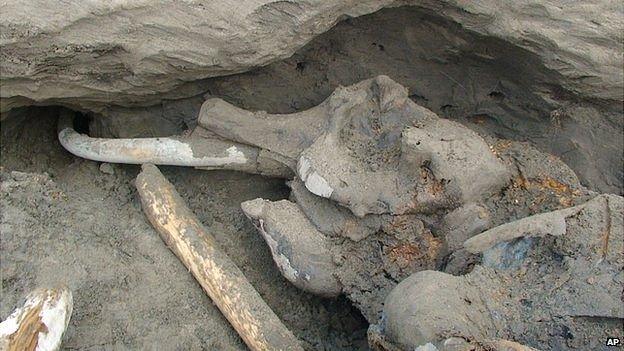Mammoth carcass found in Siberia
- Published

The carcass, discovered on Russia's Taimyr Peninsula, still has one of its tusks
A well-preserved mammoth carcass has been found in the permafrost of northern Siberia by an 11-year-old boy.
The remains were discovered at the end of August in Sopochnaya Karga, 3,500km (2,200 miles) northeast of Moscow.
A team of experts from St Petersburg then spent five days in September extracting the body from frozen mud.
The mammoth is estimated to have been around 16 years old when it died; it stood 2m tall and weighed 500kg.
It has been named Zhenya, after Zhenya Salinder, the 11-year-old who found the carcass while walking his dogs in the area.
Alexei Tikhonov, from the St Petersburg Zoology Institute, who led the team excavating the mammoth, said this specimen could either have been killed by Ice Age humans, or by a rival mammoth.
He added that it was well preserved for an adult specimen.
His colleague Sergei Gorbunov, from the International Mammoth Committee, which works to recover and safeguard such remains, said: "We had to use both traditional instruments such as axes, picks, shovels as well as such devices as this "steamer" which allowed us to thaw a thin layer of permafrost.
"Then we cleaned it off, and then we melted more of it. It took us a week to complete this task."
But several juvenile examples have come to light that are more complete.
Earlier this year, a very well preserved juvenile mammoth nicknamed Yuka was unveiled by scientists.
Found in the Yakutia region of Russia, it preserves much of its soft tissue and strawberry-blonde coat of hair. There were also signs from its remains that humans may have stolen the carcass from lions and perhaps even stashed it for eating at a later date.
- Published13 September 2012
- Published23 March 2012